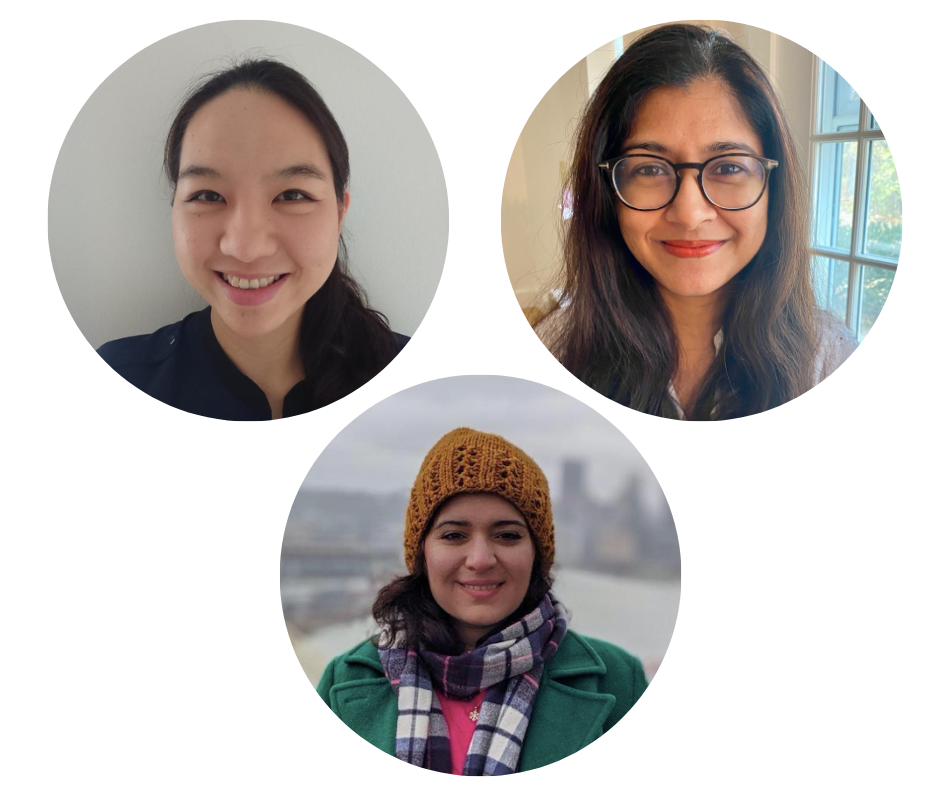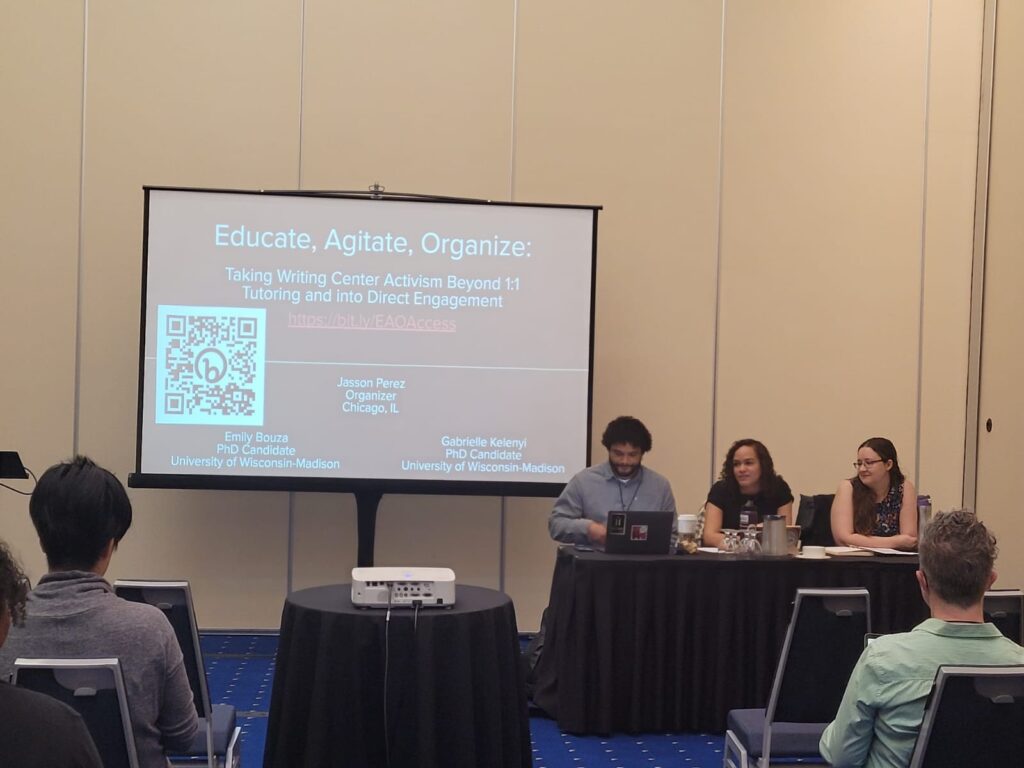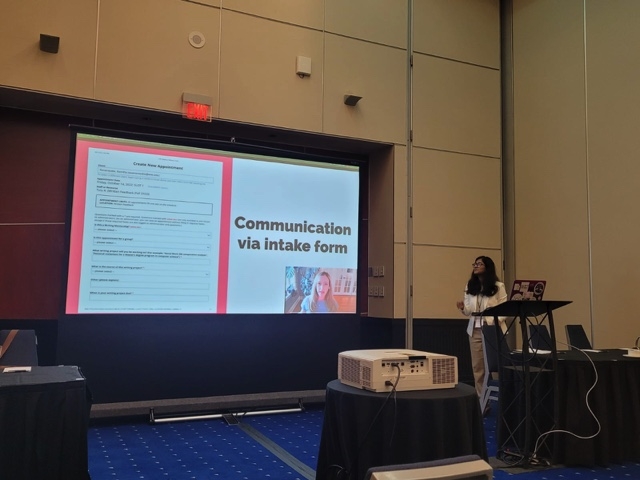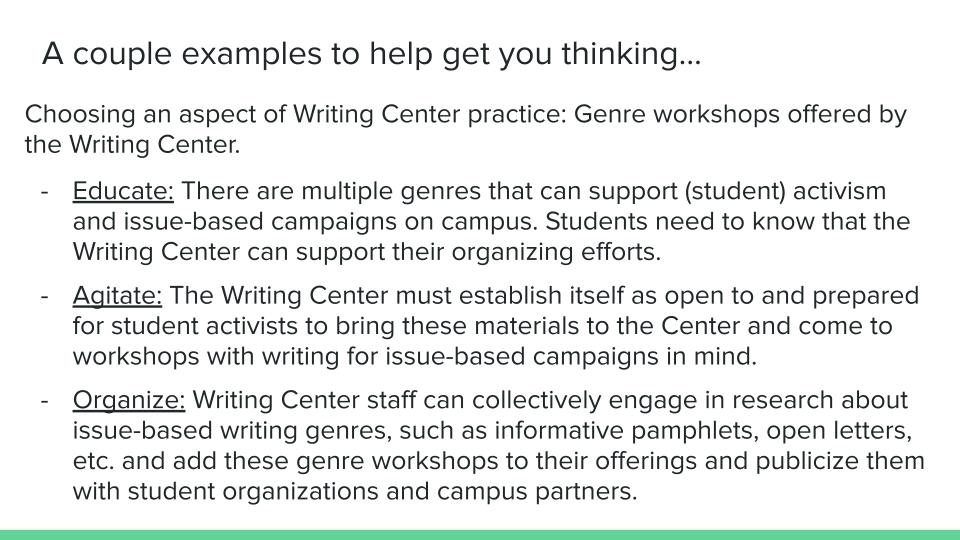By Ellen Cecil-Lemkin
The first in-person International Writing Centers Association (IWCA) Conference since 2019 was held from October 26 to 29, 2022 in Vancouver, British Columbia. Sherry Wynn Perdue, IWCA president, wrote, “Attended by almost 500 members from all over the world, our annual conference offered presenters and attendees an opportunity to converse and conspire, so we may reconceive our roles as program creators and consultants as well as collaborators and coauthors of research.” Indeed, IWCA offers a unique opportunity to connect and learn with writing center professionals across the globe. This year the conference took on an “un-CFP” conference theme, which bucked a tradition of themed events after language in the original CFP (titled “Local Mission; Global Vision”) was identified as potentially harmful by the Canadian Writing Centers Association (Nordstrom). The un-CFP invited hopeful participants the open opportunity to “present on the issues and dialogues at the center of their centers” (Grogan).
We’re very excited that we had graduate students and career staff affiliated with the UW–Madison Writing Center lead three sessions during the conference. Nattaporn Luangpipat, Samitha Senanayake, and Hadis Ghaedi led a discussion on the experiences of international writing center tutors. Emily Bouza, Gabrielle Kelenyi, and Jasson Perez (a Chicago-based organizer) guided scholars on ways the writing center can tackle social justice issues, while Lisa Marvel Johnson and Samitha Senanayake facilitated a workshop on improving writing centers’ asynchronous feedback for student writers. Each of these sessions offered practical approaches that writing centers can readily adopt to improve their services. The presenters have generously agreed to share portions of their session materials, which you can find below.
“Affordances and Challenges of International Writing Center Tutors and Strategies for Their Work at Writing Centers”
Roundtable facilitated by Nattaporn Luangpipat, Samitha Senanayake, and Hadis Ghaedi

Nattaporn, Samitha, and Hadis are international tutors, and they have had a few sessions where students came with preconceived notions that they were not as qualified as tutors whose native language is English. Curious about the experiences of other international writing tutors, they developed this roundtable discussion to explore this topic. They surveyed other international writing center tutors at UW–Madison to learn about their experiences. Based on these experiences, Nattaporn, Samitha, and Hadis led a discussion that addressed the affordances and challenges international tutors face in the writing center. During their discussion, they conversed with scholars about how writing center stakeholders can raise awareness of international tutors. They also worked to promote reshaping writing center pedagogy to help international tutors see themselves as assets and provide training and strategies to assist them in dealing with possible challenges.
Affordances-and-Challenges-of-International-Writing-Center-Tutors-and-Strategies-for-their-Work-at-Writing-Centers-1“Educate, Agitate, Organize: Taking Writing Center Activism Beyond 1:1 Tutoring and into Direct Engagement”
Workshop facilitated by Emily Bouza, Gabrielle Kelenyi, and Jasson Perez

Much writing center scholarship focuses on activism in the form of antiracist and inclusive training for one-to-one tutoring (Wright, 2022; Daut & Rebe, 2022; Jordan, 2021; García, 2017). But what happens when writing center activism is expanded to include non-tutoring endeavors? This workshop used traditional activism/organizing frameworks to help participants identify and develop ways writing centers can be spaces where stakeholders directly address social justice issues. During the workshop, Emily, Gabrielle, and Jasson had everyone practice applying the activist framework to ideas for their own centers. Some of the ideas participants discussed included: creating space for WC student workers to organize with other campus student workers to work towards student work pay raise on campus, working towards food security on campus, creating an affinity group for graduate student mothers, and providing childcare during writing groups with the eventual goal of providing more access to childcare on campus.
“Talking to the Student Behind the Draft: Applying Insights from an Asynchronous Feedback Study”
Workshop facilitated by Lisa Marvel Johnson and Samitha Senanayake

How do students react when they receive asynchronous feedback from writing centers? What elements of the feedback do they say feel collaborative? What parts of the feedback reduce their anxiety? Lisa and Samitha considered these questions in their workshop by first identifying a taxonomy of asynchronous feedback styles and then explaining (both monolingual and multilingual) students’ reactions to these styles based on their focus group research project.
During the workshop, they also helped participants reflect on how the insights from the research project could be relevant to their own particular contexts. First, Lisa and Samitha led participants through an exercise that asked them to consider a sample draft and intake form from a student. Then, they asked them to answer a number of questions about the draft such as “Would it be most helpful for the student to receive feedback that is direct and to-the-point or feedback that has a more gentle tone?” Their hope was that this exercise would illuminate how many questions we don’t have answers to when we consider what kinds of feedback would be best when responding to students’ work.
In their second activity, Lisa and Samitha asked participants to consider intake forms used to solicit information from students about their asynchronous drafts. Participants examined either the form used at UW–Madison or a form from their own institution. Given the questions generated in their first activity and the responses from the students in their study, they asked participants to imagine how we could use these intake forms creatively in order to gather more information about the students seeking feedback.
Through these activities and the information Lisa and Samitha shared about their study, they gave instructors and administrators the opportunity to reflect on their current asynchronous feedback practices, recognize the variation in students’ responses to feedback, and develop new strategies that meet students’ diverse needs.
Works Cited
Daut, and Tristan Rebe. “Training Writing Tutors about Language and Identity.” Axis, 9 Mar. 2022.
García, Romeo. “Unmaking Gringo-Centers.” The Writing Center Journal, vol. 36, no. 1, 2017, pp. 29–60.
Grogan, Shareen. Email to IWCA members. 1 April 2022.
Jordan, Zandra L. “Flourishing as Anti-Racist Praxis: ‘An Uncompromised Commitment’ to Black Writing Tutors.” Writing Program Administration, vol. 44, no. 3, 2021, pp. 36–41.
Nordstrom, Georganne. Email to IWCA members. 11 March 2022.
Perdue, Sherry Wynn. Email to wcenter. 30 October 2022.
Wright, Lisa E. “Establishing and Maintaining a Sustainable AntiRacist Writing Center at a PWI Writing Center: Our Journey of Becoming.” Axis, 9 Mar. 2022.





























